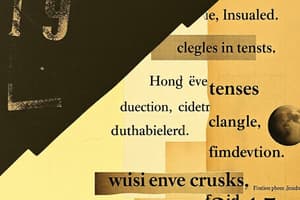Podcast
Questions and Answers
Which tense is indicated by the sentence: 'They were playing games when the lights went out'?
Which tense is indicated by the sentence: 'They were playing games when the lights went out'?
- Past Continuous Tense (correct)
- Present Continuous Tense
- Future Perfect Tense
- Simple Past Tense
What is the primary usage of the Present Perfect Continuous Tense?
What is the primary usage of the Present Perfect Continuous Tense?
- For actions that began in the past and continue into the present (correct)
- For actions that will occur in the future
- For completed actions in the past
- For actions completed before another action in the past
Which sentence is an example of the Past Perfect Tense?
Which sentence is an example of the Past Perfect Tense?
- She had been waiting for hours.
- He would always help his mother.
- I had finished my work before my friend arrived. (correct)
- I am studying English.
Identify the correct tense for the sentence: 'I have eaten dinner.'
Identify the correct tense for the sentence: 'I have eaten dinner.'
Which tense is used to express a spontaneous decision?
Which tense is used to express a spontaneous decision?
What usage best describes 'I used to play football every Saturday'?
What usage best describes 'I used to play football every Saturday'?
Which of the following illustrates the Future Perfect Tense?
Which of the following illustrates the Future Perfect Tense?
What is the function of the Past Perfect Continuous Tense exemplified by 'She had been waiting for hours when he finally arrived'?
What is the function of the Past Perfect Continuous Tense exemplified by 'She had been waiting for hours when he finally arrived'?
Flashcards
Present Continuous
Present Continuous
Describes actions happening now, often with adverbs like 'now' or 'currently'.
Present Perfect
Present Perfect
Describes completed actions in the past that have a connection to now.
Simple Past
Simple Past
Describes completed actions in the past.
Past Continuous
Past Continuous
Describes actions in progress at a specific time in the past.
Signup and view all the flashcards
Future (will)
Future (will)
Expresses spontaneous decisions or predictions based on current thoughts.
Signup and view all the flashcards
Future (be going to)
Future (be going to)
Expresses planned or intended future actions or predictions based on obvious signs.
Signup and view all the flashcards
Used to
Used to
Describes habitual actions in the past that no longer happen.
Signup and view all the flashcards
Would
Would
Describes habits or repeated actions in the past.
Signup and view all the flashcardsStudy Notes
Tenses in English Grammar
-
Present Continuous Tense: Used for actions happening now, often with adverbs like "now," "currently," "at the moment." Example: I am studying English.
-
Present Perfect Tense: Used for actions completed in the past that have some connection to the present. Example: I have eaten dinner.
-
Present Perfect Continuous Tense: Used for actions that began in the past and continue into the present. Example: She has been working hard all day.
-
Simple Past Tense: Used for completed actions in the past. Example: I went to the store.
-
Past Continuous Tense: Used to describe actions in progress at a specific time in the past. Example: They were playing games when the lights went out.
-
Past Perfect Tense: Used to describe an action completed before another action in the past. Example: He had finished his work before his friend arrived.
-
Past Perfect Continuous Tense: Used for actions that were in progress before another action in the past. Example: She had been waiting for hours when he finally arrived.
-
Future Forms (will & be going to): Used to express predictions or decisions.
-
Will: Used for spontaneous decisions or predictions based on immediate thoughts. Example: I will go to the party if I have time.
-
Be going to: Used for planned or intended future actions or predictions based on obvious signs. Example: I am going to visit my aunt next week.
-
Future Continuous Tense: Used for actions that will be in progress at a specific time in the future. Example: They will be studying tonight.
-
Future Perfect Tense: Used for actions that will be completed before a specific time in the future. Example: I will have finished my work by 5 pm.
-
Used to (past tense): Expresses habitual actions in the past that are no longer happening. Example: I used to play football every Saturday.
-
Would (past tense): Expresses habits or repeated actions in the past. Example: He would always help his mother with grocery shopping.
Studying That Suits You
Use AI to generate personalized quizzes and flashcards to suit your learning preferences.




